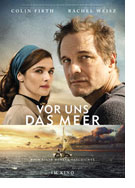

Opening 29 Mar 2018
Directed by:
James Marsh
Writing credits:
Scott Z. Burns
Principal actors:
Rachel Weisz, David Thewlis, Colin Firth, Mark Gatiss, Anna Madeley
At a boat show in 1967, Donald Crowhurst hears an announcement that sends currents rippling through him; the stakes for this event are significant: two divisions with two prizes. Don’s bombshell—his entering the solo around-the-world regatta—takes the wind out of Clare’s sails. Nevertheless, she and their children (Kit Connor, Eleanor Stagg) enthusiastically help with preparations. In no time, Don fastens down the money and boat maker; even a press agent comes onboard. Thinking about the purse bolsters the amateur sailor’s aspiration. With a fanfare sendoff from Tiegnmouth, England, Don heedlessly “takes his dreams out to sea,” turning fear into an ally. Until the dilemma is what to do and when, “I can’t go on, and I can’t go back.”
In this poignant biopic, James Marsh directs Scott Z. Burns’s screenplay about the 1968 Sunday Times Golden Globe Race that focuses on human nature instead of nature in action. Colin Firth (Crowhurst) giftedly portrays a loving husband and father whose gamble disregards all eventualities. Additionally, the novice neglects to hedge his bet. Rachel Weisz’s (Clare) portrayal as Don’s counterpart demonstrates grit, practical understanding, and compassion navigating the best course for her family. Ken Stott (Stanly Best) adds nuanced balance to his performance as an astute, yet solicitous small town businessman. David Thewlis (Rodney Hallworth) captures his character’s unabashed profiteering.
The supporting cast is good, as are production values: Eric Gautier’s cinematography, Jóhann Jóhannsson’s music, and Jinx Godfrey and Joan Sobel’s editing that moves the story forward while switching between the past and present. All Is Lost (2013) shows an experienced sailor’s ordeal wrestling the sea, in contrast to what could be termed Crowhurst’s folly. Then again, truth is stranger than fiction. Consequently, the disturbing ending is easier to comprehend; black cards add clarification at the end. The Mercy pulls at audiences’ heartstrings, perhaps, just as clemency was what Crowhurst sought. “Men do not decide to become extraordinary, they decide to accomplish extraordinary things.” (Marinell Haegelin)